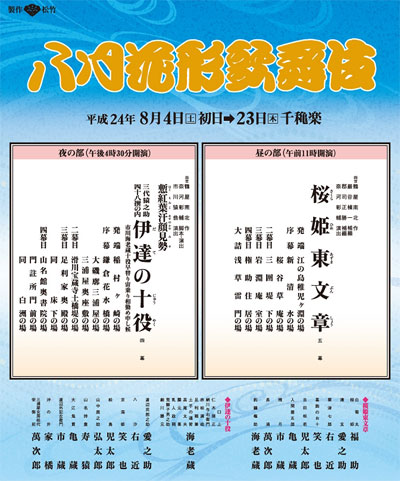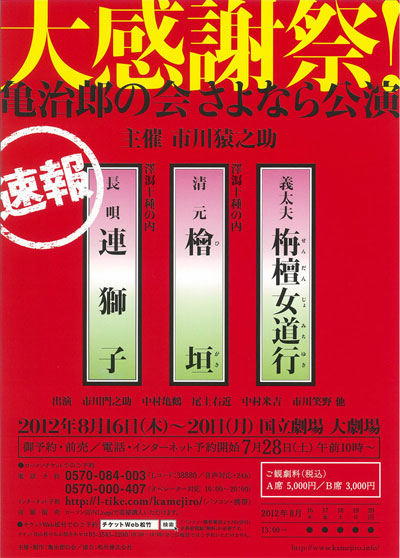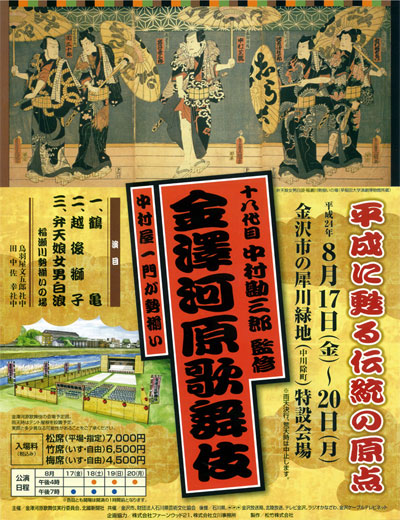| AUGUST 2012 |
|
5 shows in T˘ky˘ (Shinbashi Enbuj˘, National Theatre), 4 in ďsaka (National Bunraku Theatre, ďsaka N˘gaku Kaikan) and 1 in Kanazawa (Saigawa Ryokuchi K˘en)!
|
| Shinbashi Enbuj˘ (T˘ky˘) |
| Dates | 4 ~ 23 August 2012 (Hachigatsu Hanagata Kabuki) August Young Actors Kabuki |
| MatinÚe | |
| Evening | |
| Casting |
Ichikawa Ebiz˘, Kataoka Ainosuke, Nakamura Fukusuke, Ichikawa Ukon, Ichimura Kakitsu, Kataoka Ichiz˘, Ichikawa Emiya, Kataoka Kamez˘, Ichimura Manjir˘, Ichikawa K˘tar˘, Ichikawa Juen, Nakamura Kotar˘ |
| Comments |
|
 |
| National Theatre (T˘ky˘) |
| Dates | 4 ~ 5 August 2012 (Ne no Kai) |
| Program |
Oimatsu Goj˘ Bashi Meriyasu Onnagi Sh˘jir˘ Renjishi |
| Comments |
14th edition of the summer program of the association Ne no Kai (literally 'the Sound Association'). The first four items feature only the geza musicians and the Nagauta music ensemble. The last one is a Kabuki drama, which stars disciples of major actors. |
| Dates | 16 ~ 20 August 2012 (Kamejir˘ no Kai Sayonara K˘en) Kamejir˘ Gala Farewell Performances |
| Program |
Sendanjo Michiyuki |
| Casting |
Ichikawa Ennosuke, Ichikawa Monnosuke, Nakamura Kikaku, Onoe Ukon, Nakamura Yonekichi, Ichikawa Emino |
| Comments |
The 10th and final edition of the gala of the association Kamejir˘ no Kai, which supports the young and talented actor Ichikawa Ennosuke, who stopped using the name of Ichikawa Kamejir˘ in June 2012. Next year, we assume there'll the 1st edition of the Ennosuke no Kai! |
 |
| Dates | 23 ~ 26 August 2012 (Chigyokai/Kabukikai) |
| Program |
Ehon Taik˘ki (Amagasaki Kankyo) |
| Comments |
18th edition of the common program for 2 associations, the Chigyokai (the Young Fishes Association) and the Kabukikai (the Kabuki Association), which stars stars' disciples in the leading roles of all the items in the program. |
| National Bunraku Theatre (ďsaka) |
| Dates | 10 ~ 11 August 2012 (Kamigata Kabukikai) |
| Program |
Koi Bikyaku Yamato ďrai (Ninokuchi-mura) Kaga no Chiyo Ukare Kakubei Ukamuse no Sh˘j˘ |
| Comments |
22nd edition of the Kamigata Kabukikai (the Kamigata Kabuki Association), a summer program in ďsaka which stars Kamigata Kabuki stars' disciples in the leading roles of all the items. |
| Dates | 18 ~ 19 August 2012 (Band˘ Shinsha no Kai) |
| Program |
|
| Casting |
Band˘ Shinsha, Band˘ Takesabur˘, Kamimura Kichiya, Ichikawa En'ya, Nakamura Kazutar˘ |
| Comments |
1st edition of the gala of the association Band˘ Shinsha no Kai, which supports the young and talented Narikomaya actor Band˘ Shinsha. |
| Dates | 25 ~ 26 August 2012 (Matsuo-juku Kodomo Kabuki) Matsuo Academy of Kabuki ~ Kabuki for Kids Performance |
| Program |
Ume no Yoshibŕ Nagauta Suehirogari |
| Comments |
The Matsuo-juku Kodomo Kabuki [website in Japanese] is a kodomo shibai troupe, founded in ďsaka in 1988 by Matsuo Hazue, the wife of Matsuo Kuniz˘ (1899~1984), whose name is closely associated to the Matsuo Artistic Awards (Matsuo Gein˘ Sh˘). The troupe is now led by Matsuo Hazue's daughter Matsuo Hideko. The troupe celebrates its 25th anniversary in 2012! |
| ďsaka N˘gaku Kaikan (ďsaka) |
| Dates | 25 August 2012 (Sennoj˘ no Kai) |
| MatinÚe |
Shizuka to Tomomori |
| Evening |
T˘senj˘ Shizuka to Tomomori |
| Casting | |
| Comments |
1st edition of the gala of the association Sennoj˘ no Kai, which supports the young and talented Narikomaya actor Nakamura Sennoj˘. |
| Saigawa Ryokuchi K˘en (Kanazawa) |
| Dates | 17 ~ 20 August 2012 (Kanazawa Kawara Kabuki) Kanazawa Riverbed Kabuki |
| Program | |
| Casting |
Nakamura Tsurumatsu, Nakamura Kosabur˘, Nakamura Nakashir˘, Nakamura Nakanosuke, Nakamura Ich˘, Sawamura Kunihisa |
| Comments |
Outdoors Kabuki performances near the Saigawa river in the city of Kanazawa. A temporary structure is built in the Saigawa "Green" Park. |
 |
|
|
| Contact | Main | Top | Updates | Actors | Plays | Playwrights | Programs | Links | FAQ | Glossary | Chronology | Illustrations | Prints | Characters | Derivatives | Theaters | Coming soon | News |